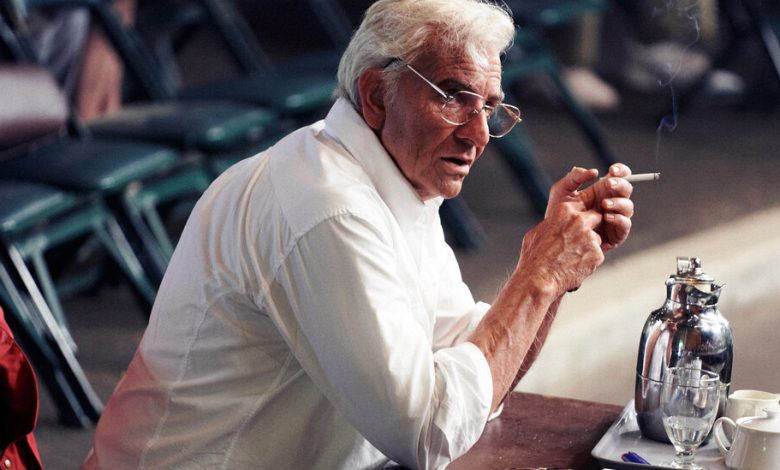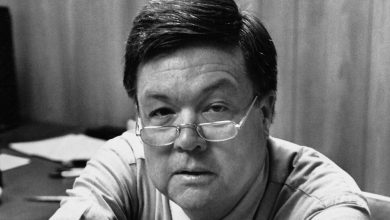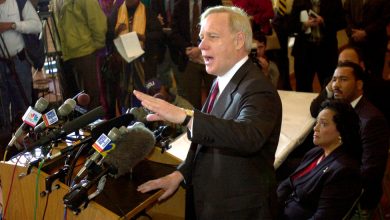‘Maestro’ Won’t Let Leonard Bernstein Fail

Three society women in cocktail dresses stare up at the camera, each with her right fist raised in the Black Panther salute. The cover line: “Free Leonard Bernstein!”
This was New York Magazine’s issue of June 8, 1970, which led with Tom Wolfe’s gleeful 25,000-word evisceration of a party that had been held at Bernstein’s Park Avenue apartment that January. The purpose was to raise awareness of — and money for — the 21 Panthers in jail awaiting trial on charges of planning political violence.
Their incarceration had become a cause célèbre among a certain set of well-off white liberals, of whom Bernstein and his wife, Felicia — the subjects of “Maestro,” Bradley Cooper’s movie about their troubled marriage, now streaming — were prime examples.
The backlash to the party’s “elegant slumming,” as The New York Times put it in an editorial, was swift and brutal. Wolfe’s story, months later, was only the most expansive piece of anti-Bernstein criticism. Jewish groups incensed at some of the Panthers’ positions picketed his apartment building and booed him when he led the New York Philharmonic. “Radical Chic,” as the article was titled inside the magazine, was one of the loudest, bitterest scandals Bernstein ever experienced.
It is also one of the many things that go unmentioned in “Maestro,” a depiction of a peerlessly multifaceted musician who was among the great cultural personalities of the 20th century. Bernstein (1918-90) was a composer, conductor, arranger, pianist, best-selling author and TV educator to millions. It can be hard today to imagine a classical musician being a glamorous mainstream celebrity, but that was Lenny. His tenure as music director of the New York Philharmonic in the 1960s — which began as his “West Side Story” star was gleaming — is still considered the orchestra’s modern heyday.
Every biopic is a selective version of a life, and Bernstein’s wide-ranging and eventful life is more in need of selectivity than most. But “Maestro” is unblinkingly focused on Leonard and Felicia’s marriage, its ups and downs caused in large part by his romantic desires toward men.
For Cooper, Bernstein’s consistent struggle in his marriage is countered by just-as-consistent success in his art and career. The movie bursts open with the 25-year-old Lenny’s triumphant, last-minute debut with the Philharmonic at Carnegie Hall in 1943. Broadcast nationally over the radio, it jump-started a half-century of renown.
From there, it’s a parade of acclaim: the bright-toned early ballets and musicals, the stirring final chorus of “Candide,” a soul-shaking performance of Mahler’s Second Symphony, packed parties (not the political ones), broadcast interviews.
There are some flies in the ointment. Bernstein long grumbled that he wished he could compose when all the world wanted was more of his conducting, and “West Side Story” burdened him as he sought fame for his more “serious” music. The film briefly alludes to this, with Bernstein’s manager trying to squeeze as much money as possible out of podium work. But on the whole, “Maestro” shows Bernstein the artist as perfectly satisfied (and perfectly acclaimed), while Bernstein the man is fatally flawed.
His relationships with men after his marriage are portrayed as more glancing and casual than they were in reality. And his separation from Felicia in 1976 and ’77, when he tried to live openly as gay, is treated in “Maestro” as a selfish mistake. The most indelible showcase for Bernstein’s sexuality in the film is a late-in-life, almost Mephistophelean dance party — as sweaty as his calisthenic conducting, bathed in lurid red light — as he seduces a student.
There’s lots of the man’s defects in “Maestro”; the artist’s are nowhere to be found. Missing entirely is “1600 Pennsylvania Avenue,” his flop of a musical with Alan Jay Lerner that closed after seven performances on Broadway in 1976. And missing are his three grimly unsuccessful symphonies, the kind of high-minded music he wanted to be remembered for instead of “On the Town.”
Bernstein plays a bit of it on the piano at the beginning of the film, but otherwise missing, too, is “A Quiet Place,” the serious opera he longed to write his whole career — and which some 40 years later is still being futzed with by his estate to try and make it work onstage. While a scene in “Maestro” is set at the premiere of his “Mass,” which helped open the Kennedy Center for the Performing Arts in 1971, we aren’t made aware of its mixed reception.
And from that smash debut at Carnegie on, the film treats Bernstein as unimpeachable on the podium. But though he is today widely revered as a conductor of the music of others, that was hardly a universal opinion at the time. A 1967 Times review by Harold Schonberg, a longtime Bernstein skeptic, describes “an overblown and rather vulgar performance” of Mahler’s Second: “He took a terribly slow tempo, and that made his heavy-handed expressive devices — those pauses! those rubatos! — all but wrapped up in comic-strip balloons: Pow! Wham! Sigh!”
But no one in “Maestro” nay-says Bernstein’s music making. This artificially heightens the contrast of his career with his marriage, distorting the viewer’s sense of him and his legacy. As an admirer of Bernstein’s work, warts and all, I was disappointed to find his life as an artist depicted as less complex — and less interesting — than his life as a husband.
Cooper doesn’t pay much attention to Bernstein’s personal stumbles, either, if they don’t relate to the marriage. Most glaring is the “Radical Chic” affair, in which his critics seized on the contrast between Upper East Side progressivism and open radicalism, with Bernstein being quoted in The Times (unfairly, he said) as answering a Panther’s call to seize the means of production with “I dig absolutely.”
It would have been an intriguing episode to include in “Maestro” since bothBernsteins were implicated in the blowback, which served to unite them in fiasco. But that would have been jarring because it’s so unlike the scenes preferred by Cooper, in which Lenny is the perpetrator and Felicia the victim. Omitting the whole scandal contributes to the film’s flattening not just of Bernstein’s life but also of Felicia’s, which was full outside the marriage, too. (She was active in the American Civil Liberties Union, the civil rights movement and protests against the Vietnam War.)
“Radical Chic” was big news. But what I missed most in “Maestro” was a minor bit of Bernstein: the 1952 one-act “Trouble in Tahiti,” a deceptively peppy, stealthily devastating piece about a prosperous, unhappily married suburban couple.
This was an autobiographically charged work; the main characters were originally named Sam and Jennie, the names of Bernstein’s parents, who fought bitterly through his childhood. (The wife’s was eventually changed to the more singable Dinah, the name of Bernstein’s paternal grandmother.)
But the movie presents Bernstein as a fully formed genius, without an evident childhood or parents beyond a passing mention of his father’s cruelty. It would have made sense for Sam and Jennie to have been more present in “Maestro,” if only to offer some context for Bernstein’s own difficult marriage. The sense of history repeating itself might have relieved some of Cooper’s insistence on Bernstein and his sexuality bearing sole responsibility for his problems with Felicia.
All these omissions lead to a rigid, either-or, black-and-white atmosphere. And for all Cooper’s well-practiced facsimiles of Bernstein’s galvanizing, perspiring, emotionally all-in style on the podium, that gives the film a stilted, brittle quality at its core.



